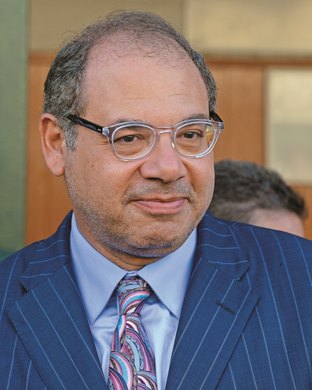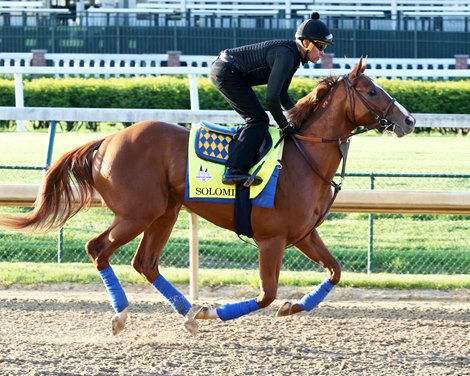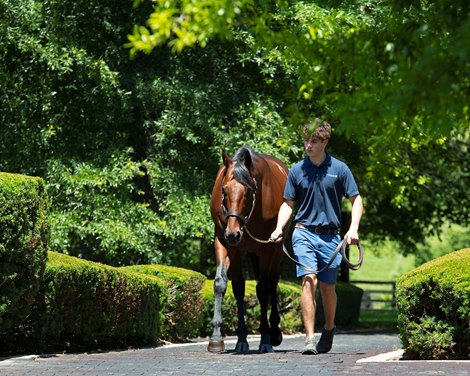In Kentucky's highest court, MGG Enterprises, agent of a consortium of New York financiers, is seeking the right to recoup sales proceeds from the buyers of several Zayat Stables horses and shares of American Pharoah.
Those buyers are some of the most prominent names in the Thoroughbred industry.
Before a phalanx of attorneys and a packed courtroom, the Kentucky Supreme Court heard oral arguments Feb. 8 pitting MGG, a lender of millions of dollars to Zayat Stables, against buyers of some of the now-defunct Zayat operation's Thoroughbreds and breeding interests. The parties landed in court when money generated by purchases did not turn up in the hands of the lender, even though it held liens on the assets.
So far MGG has been unsuccessful in its legal efforts against the buyers and only partially so against the Zayat business itself. After the Zayat loan lapsed into default in early 2020, MGG obtained in Fayette Circuit Court in Lexington an uncontested judgment of more than $24 million. Ahmed Zayat and Zayat Stables subsequently took shelter in bankruptcy court, where MGG filed several adversary proceedings based on allegations of fraud and other misconduct. Those claims were eventually settled for substantial sums, but sums well short of the defaulted obligation.

According to court records, MGG's loan package originally was $30 million and was secured by "all horses" and "breeding rights, lifetime breeding rights and/or fractional interests therein" of the Zayat operation. Zayat Stables promised to report any intended sales to MGG. Instead, MGG said in a court filing, "Zayat Stables, its owner Ahmed Zayat, and other members of the Zayat family nevertheless embarked on a covert and fraudulent multiyear scheme to sell horses and breeding rights in violation of the agreement" between September 2017 and December 2019.
The sales included breeding rights to American Pharoah to LNJ Foxwoods and Orpendale, breeding rights in stakes-winning mare Lemoona to Flintshire Farm and Brad Sears, and horses El Kabeir to Yeomanstown Stud, American Cleopatra to Hill 'n' Dale, and a 50% interest in Solomini to McMahon Thoroughbreds.
The fallout resulted in the current litigation against those buyers along with Orpendale affiliate Bemack, an overseas corporation tied to Ashford Stud, Coolmore's North American operation. According to an MGG filing with the Supreme Court, "All of MGG's claims rest on the premise that respondents took title subject to MGG's first, prior, and perfected security interest" in the sold collateral.
MGG's claims already were denied as a matter of law in Fayette Circuit Court, and the Kentucky Court of Appeals affirmed. MGG's recourse was to ask the Kentucky Supreme Court to accept the case by exercising what is called "discretionary review." Kentucky law does not contain a right to be heard in the Supreme Court; rather, it is within the high court's discretion whether to take up an appeal, which it does, according to court rules, "when there are special reasons for it." The Supreme Court accepted the case and heard arguments Wednesday.

With Chief Justice Laurance VanMeter presiding, attorney Kannon Shanmugam of the Washington, D.C. law firm of Paul, Weiss, Rifkind, Wharton & Garrison argued for MGG. David Royse of the Lexington firm of Ransdell Roach & Royse represents Hill 'n' Dale and argued on behalf of the buyers.
Two sets of statutes, federal and state, could determine winners and losers in the MGG appeal. There are sub-issues about whether some of MGG's claims were filed in a timely manner, whether MGG took measures to protect itself by inspecting its collateral, and whether MGG properly preserved its primary legal argument in Fayette Circuit Court, but the main issue being heard was voiced by VanMeter.
"Who bears the risk of dealing with fraud?" VanMeter asked during an exchange with Shanmugam, who said a lender should not bear the risk when buyers can check public records for liens. Were it otherwise, Shanmugam said, it means "leaving the lender holding the bag in the event of fraud." Royse argued that with the passage of the federal Food Security Act in 1985, "Congress said we are shifting that risk" to lenders.
It is possible the ultimate outcome may not be the same for the sale of a Thoroughbred and the sale of a breeding right. A key question is whether either or both are "farm products" under the FSA. The definition of a farm product depends on how the statute is interpreted, and that's one of the jobs before the court.
Under the FSA, if a sold asset is a farm product secured by a lien, the buyer is totally protected from claims of secured creditors even if the buyer has knowledge of the lien. That is how the case has been decided so far.
The FSA says the term "farm product" means "an agricultural commodity such as wheat, corn, soybeans, or a species of livestock such as cattle, hogs, sheep, horses, or poultry used or produced in farming operations, or a product of such crop or livestock in its unmanufactured state (such as ginned cotton, wool-clip, maple syrup, milk, and eggs), that is in the possession of a person engaged in farming operations."
Are species of livestock part of the statute's definition of commodities, or does the statute define two kinds of farm products: commodities such as crops, and species of livestock such as horses? If animals are treated as a commodity under the statute, does the definition include a breeding right or an animal such as a high-priced Thoroughbred?
"I agree that a Thoroughbred is not a commodity," VanMeter said in response to Shanmugam's take on the statute. "That is the question, how is the statute to be interpreted."

The court and attorneys agreed the case is the first time in the nation this topic has been litigated, but Royse and Shanmugam didn't see eye-to-eye much beyond that.
"This is the first time it's been argued when Congress said horse, it didn't mean horse," Royse said. "A horse is a horse." Shanmugam responded that American Pharoah was the first Triple Crown winner in many years and it's the first time since the FSA was adopted that proceeds of a breeding right of such value were in dispute.
Along with VanMeter, Michelle Keller and Kelly Thompson were among the justices most verbally engaged. Keller, reflecting on MGG's arguments, commented, "Maybe we shouldn't turn this thing on its head." Early in the hearing Thompson focused on the rights of banks, asking if a lender's lien could ever be secure under these circumstances.
Adding spice to the litigation's recipe was an amicus curiae, or "friend of the court," brief filed by the Kentucky Bankers Association. The brief argued that the lien system in place works well and will not be the ruination of the Thoroughbred lending industry should the Supreme Court affirm the judgment of the Court of Appeals.







